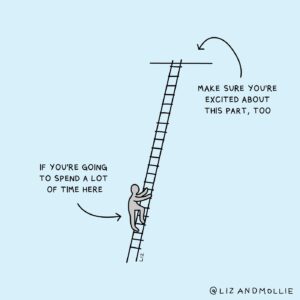Morgan Housel has written that, for him, the highest form of wealth is the ability to wake up every morning and say, “I can do whatever I want today.”
Happiness is a complicated subject because everyone is different. But if there’s a common denominator in happiness — a universal fuel of joy — it’s that people want to control their lives. To be able to do what you want, when you want, with whom you want, for as long as you want, is priceless.
This echoes a thought I’ve heard a few times which is that wealth is measured on a calendar, not a calculator.

I think the majority of us agree with and understand this principle. The most common response when I ask people why they want to retire or become financially independent is, “I want to do what I want when I want.”
Great answer. One of money’s greatest intrinsic values is it can give you the freedom to do what you want.
However, the natural next question that begs to be asked is, “So, what do you want to do?”
Silence.
This is where people struggle to come up with an adequate answer. Hardly anyone has thought with specific, vivid details of what they’d do if money wasn’t a restraint. Sure, most people will say something general like they want to travel more or spend more time with their kids. But very few have a specific idea of how they’d fill their time if they didn’t have to work to make money.
This is a problem. A good problem that a lot of people would gladly sign up for, but still a problem nonetheless. I’m reminded of this illustration I saw from lizandmollie:

If you’re going to work so hard to accumulate wealth to give you the freedom to control your time, you should probably know what you want to do with that time.
Now, there are plenty of people working to become financially independent, not because they necessarily want to change their lifestyle or to stop working, but because they want the option to do so. Which is valid.
There is a difference between working hard because you want to and working hard because someone else told you you had to. Even if you’re doing the same work, the independence to do it on your own terms changes the way you feel about the work—just as sleeping in a tent is fun when you’re camping but miserable when you’re homeless.
Five-year-old Franklin Roosevelt once complained that his life was too dictated by rules. So his mother gave him one day free of structure to do whatever he pleased. His mom wrote in her diary that day: “Quite of his own accord, he went contently back to his routine.”

The inspiration for this post came from my good friend Josh Packard who recently told me I needed to write a short, self-reflection article that would get people thinking about what they’d do if they didn’t have to work. In his words:
“People need to find passions and hobbies that they enjoy doing or life’s not worth living. You can have all the money in the world, but it won’t matter if you aren’t passionate about something.”
I think that’s a pretty good point. Money itself isn’t the goal, it’s simply a means to an end. It allows you to pursue whatever you’re passionate about.
Too many people treat their personal finances the same as corporate finances. While the purpose of corporate finance is to maximize earnings at all costs, personal finance seeks to maximize happiness and life satisfaction. The goal of personal financial planning isn’t to stockpile the largest amount of money by the end of your life, it’s to use money as a tool to live your best life.

I’ve shared this story before, but I’m going to share it again because it’s a real-life example of how money is simply a means to an end.
There’s a financial advisor who tells the story of a client who actually gets angry in meetings when hearing about his portfolio returns or how much money he’s making. None of that stuff matters to this particular client. All he cares about is whether he has enough money to keep traveling with his wife. That’s his only benchmark.
“Everyone else can stress out about outperforming each other,” he says. “I just like Europe.”
He understands that money gives him control over his time and he knows how he wants to spend it. Do you?
Thanks for reading!

